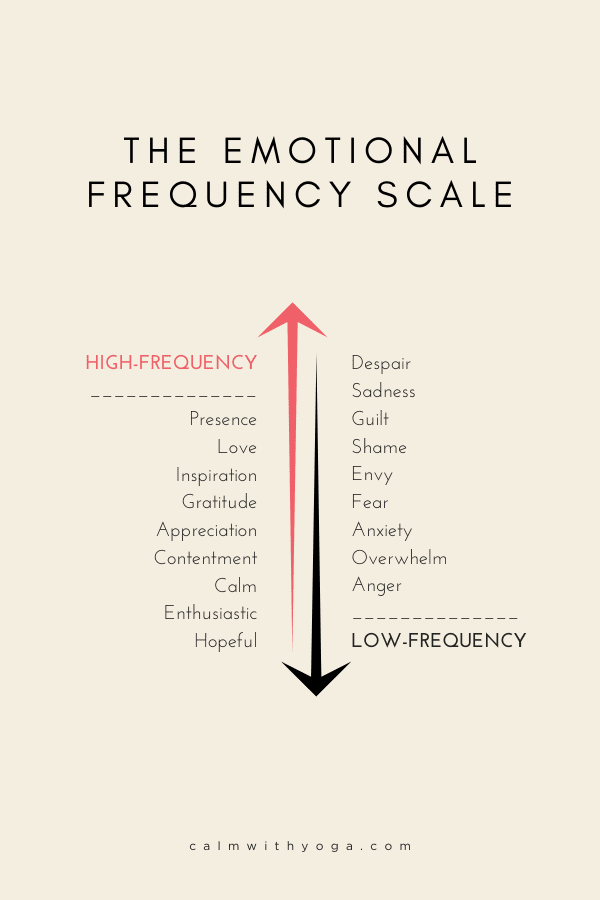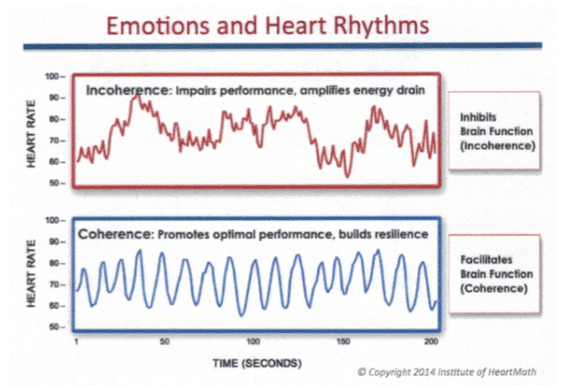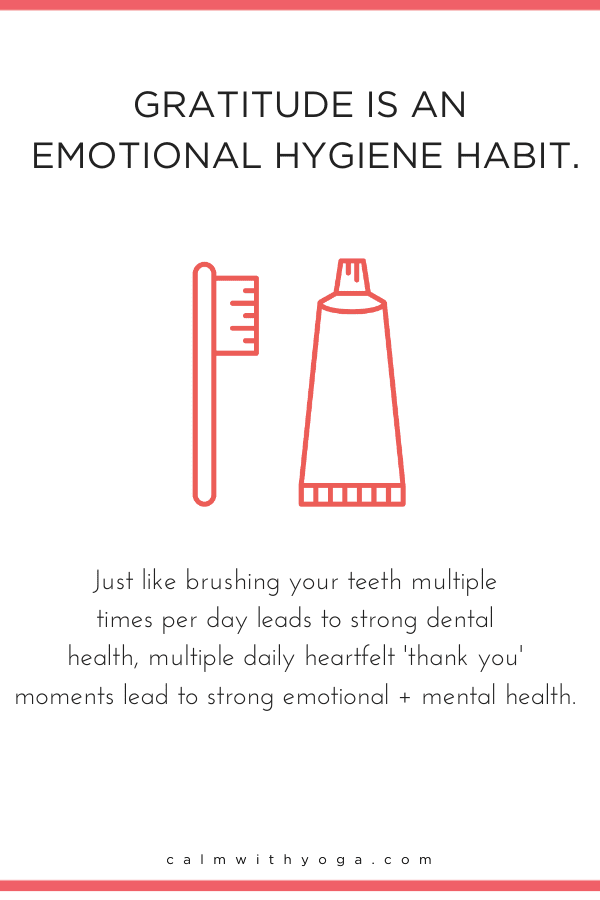God gave you a gift of 86,400 seconds today. Have you used one to say “thank you”?
– William A. Ward, Writer & poet
It can be really hard to invoke genuine feelings of gratitude when you’re feeling overwhelmed, stressed, or feeling low.
And yet, almost paradoxically, gratitude is a powerful antidote to help you rise above a frazzled mental state, high-stress levels, and negative experiences.
When you feel and express gratitude in daily life you rewire your brain in ways that boost mental health, bodily functions, and overall well-being.
Gratitude increases self-esteem, and according to positive psychology research, grateful people tend to be happier, more fulfilled, and inspired people.
Gratitude is a habit to be cultivated and a muscle to be developed.
Cultivating a lasting habit, and toning a weak muscle takes time, practice, and persistence.
Because thankfulness and appreciation are such effective tools for mental and emotional well-being, it’s important to instill the attitude of gratitude early on in our kids.
That means that as moms and stewards of these little beings we have a duty and responsibility to model this empowering mindset and lead by example.
The Emotional Frequency Scale
We tend to think in terms of ‘positive’ emotions and ‘negative’ emotions but let’s shift this perspective around a bit…
If we think of emotions as ‘energy in motion’ (e-motion) or energetic frequencies, then we can categorize them into two types:

High-Frequency emotions lift us into an upward spiral, they elevate us.
They strengthen us physically, mentally, emotionally, and energetically.
Low-Frequency emotions are heavy emotions that drag us down the scale and cause us to feel heavier.
Issues pop up when we stay at a particular low frequency for too long, like, for example when we’re chronically anxious, resentful, sad, angry, or depressed.
We get used to this lower frequency and that makes it harder to climb up the scale.
This is why cultivating the habit of self-awareness is so important.
Self-awareness helps us observe ourselves in order to notice where we are on this emotional scale.
We can then use thankfulness, appreciation, and contentment as a way to climb up and rise in awareness and emotional frequency.
The real gift of gratitude is that the more grateful you are, the more present you become.
– Dr. Robert Holden, Psychologist & Author
The empowering effects of gratitude can only be experienced when authenticity and consistency are present.
And I don’t mean the half-assed, rushed, rote, glossed-over kind of gratitude.
This is about feeling the energy of gratitude light up your insides.
You know you’re in the space of gratitude because you viscerally and physically feel a shift.
Goosebumps, or a warm sensation in your body, or a shiver up the spine, or an uncontrollable smile, or watery eyes – these are all symptoms of gratitude in action.
The Incredible Health Benefits of ‘Thank You’

The practice of gratitude can have dramatic and lasting effects in a person’s life.
It can lower blood pressure, improve immune function and facilitate more efficient sleep.
Gratitude reduces lifetime risk for depression, anxiety and substance abuse disorders, and is a key resiliency factor in the prevention of suicide…
Gratitude blocks toxic emotions, such as envy, resentment, regret and depression, which can destroy our happiness.
It’s impossible to feel envious and grateful at the same time.
Robert Emmons, PhD, professor of psychology at UC Davis and leading scientific expert on the science of gratitude
The image above was taken as part of a study conducted by the Institute of Heartmath, which wanted to track how different emotions affect the body, specifically how they affect the heart.
The heart rhythm reading on top in red was recordedduring a moment of frustration, another low-frequency emotion.
Notice the erratic, jagged pattern that represents energy being drained while brain function and performance are impaired.
The bottom blue reading was recorded during a moment of appreciation.
Notice the more harmonious, sine-wave-like pattern that represents optimal brain function, improved performance, and increased resilience.
This is a physical representation of the power of high-frequency emotions.
They can impact our ability to think, process, create, reason, and remember.
They even strengthen our physical bodies by building up our bodily systems and organs while even strengthening our immunity.
In fact, multiple studies are now proving how powerful gratitude, appreciation, and contentment can be.
According to the University of California Davis Research:
“Gratitude is associated with higher levels of good cholesterol (HDL), lower levels of bad cholesterol (LDL), and lower systolic and diastolic blood pressure, both at rest and in the face of stress.
It also has been linked with higher levels of heart rate variability, a marker of cardiac coherence, or a state of harmony in the nervous system and heart rate that is equated with less stress and mental clarity.
Gratitude also lowers levels of creatinine, an indicator of the kidney’s ability to filter waste from the bloodstream, and lowers levels of C-reactive protein, a marker of cardiac inflammation and heart disease.”(1)
They also found that:
- Those who practice gratitude regularly are more likely to exercise more and care for their bodies more which in turn helps to better manage anxiety and depression.
- Those who keep gratitude lists and gratitude journals are more likely to progress towards important personal goals (academic, interpersonal, health-based.)
- Practicing gratitude before bed can help you sleep better and have better quality sleep. (2)
Low-frequency emotions are shown to have the opposite effect.
They wear us out physically, emotionally, and mentally.
They initiate a cascade of stress hormones that weaken our bodies by impairing functions like digestion, immunity, and metabolism.

A Grateful Brain Can Shift Anxiety, Irritability, & Depression…
Gratitude changes brain activity and helps stabilize mood imbalances too.
One study took 43 individuals entering psychotherapy for anxiety and/or depression and assigned them a simple exercise like writing gratitude letters.
Three months later they underwent brain scans.
The researchers found that such a simple gratitude exercisechanged the subject’s brain in a way that was “associated with significantly greater and lasting neural sensitivity to gratitude.” (3)
Cognitive neuroscientist Dr. Christian Garrett explains the implications of the study results:
“The more practice you give your brain at feeling and expressing gratitude, the more it adapts to this mind-set…
The more of an effort you make to feel gratitude one day, the more the feeling will come to you spontaneously in the future.” (4)
fMRI brain scans show that gratitude journaling may have an influence in prefrontal cortex activity by stimulating brain-reward responses which boosts mood and deepens feelings of altruism and compassion for others. (5)
So how can you deepen your own gratitude practiceso you can shift your brain and begin experiencing these powerful benefits?
Here are 3 simple ways:
1. Daily Gratitude Writing: Keep a Gratitude List on your phone so it’s handy and goes everywhere with you. Add three new things each day. (You can include your kids in this exercise and make it a family affair.)
2. Schedule in Gratitude Minutes by creating reminders and alarms on your phone every 2 or 3 hours. (Take 60 seconds out of your day to intentionally workout this muscle.)
3. Whenever you catch yourself focusing on what’s wrong or what’s missing, or what you don’t have, turn it around immediately by noticing 3 things that you do have, are going right, and 3 things you’re grateful for. (This is a good one for kids’ training as well!)
References:
(1)https://www.ucdmc.ucdavis.edu/medicalcenter/features/2015-2016/11/20151125_gratitude.html
(2)http://emmons.faculty.ucdavis.edu/gratitude-and-well-being/
(3) https://www.ncbi.nlm.nih.gov/pubmed/26746580
(4)https://www.thecut.com/2016/01/how-expressing-gratitude-change-your-brain.html#
(5) https://www.healthimaging.com/topics/advanced-visualization/fmri-illuminates-brain-changes-those-who-show-more-gratitude













